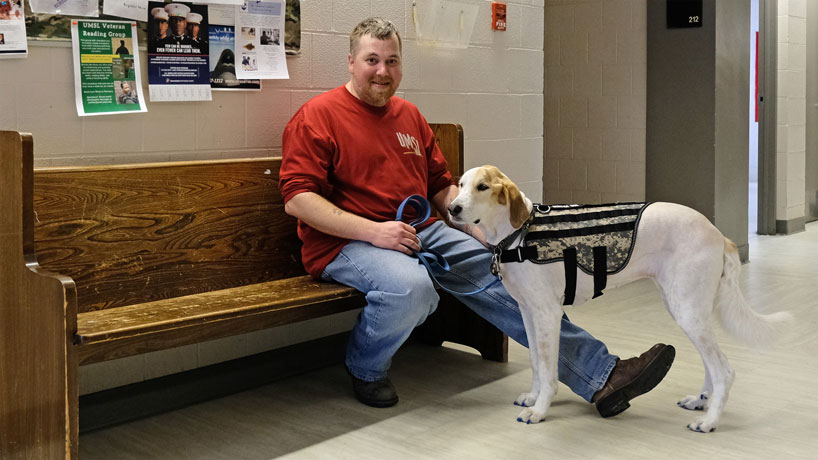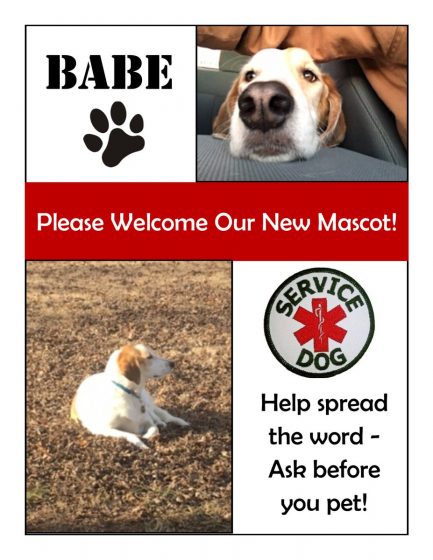
Babe, the service dog to military veteran and UMSL student Bill Schnarr, is Schnarr’s forever companion and constant support as he returns to school for his business degree in the midst of coping daily with PTSD. Babe is the first registered veteran service dog on campus. If you come across her and Schnarr, remember to ask before petting. (Photo by August Jennewein)
Dogs. If you don’t fall into the allergy, phobia or cat-only camps, chances are you fall into the cuddly, fur-loving, I-want-to-pet-that-dog-now camp.
But do yourself and Babe, the service dog to student veteran Bill Schnarr, a favor – ask before petting.
Babe is the first registered veteran service dog at the University of Missouri–St. Louis. She’s also become the informal mascot of the UMSL Veterans Center. So if you are in Clark Hall, the Social Sciences & Business Building or elsewhere on North Campus, you may run into Babe (and Schnarr).
“Just keep in mind it’s a service dog,” Schnarr says. “That dog is there to work for the person it is with.”
Schnarr also suggests not asking too many questions or prying out of politeness and respect for the handler and their service animal.

Babe is the UMSL Veterans Center’s new, informal mascot as well. She’s seven and a half people-years old and an American Fox Hound and Great Pyrenees mix. (Flier courtesy of UMSL Veterans Center)
Babe accompanies Schnarr everywhere he goes, including his UMSL classes. It’s their first semester on campus as he pursues his business administration degree. As Schnarr’s 24/7 sidekick, Babe helps him cope with his post-traumatic stress disorder.
PTSD affects each person with it differently. For Schnarr, it manifests as deep anxiety and depression. When Babe senses Schnarr’s anxiety starting to run away from him, she’ll nose at his hand a bit and try to get him to pet her.
“It kind of snaps me back to reality a little bit,” Schnarr says. “I know for me, if my anxiety gets up, the flashbacks start.”
Schnarr’s PTSD developed during his time in the military. After 9/11, he felt called to action. Schnarr first enlisted in the U.S. Navy in 2002 before joining the Missouri National Guard and then enlisting with active-duty Army in 2009. He medically retired in March 2013. Later that year, on April Fools’ Day, Schnarr got Babe.
“Transitioning from military to civilian life isn’t the easiest thing in the world,” he says. “I still struggle with it. I still carry a lot of that military mentality with me. So I guess Babe’s kind of been my anchor, outside of my wife and kids. She’s been the silent best friend.”
Schnarr isn’t shy about Babe and the big help she is to him on a day-to-day basis. He’d rather be open about the support she provides him than go the PTSD battle alone.
“I think Babe is kind of that pillar of raising awareness of guys with PTSD, because PTSD is actually a killer,” he says. “It will take your life if you let it.”
The newest report on veteran suicide from the U.S. Department of Veterans Affairs shows that in 2014, an average of 20 veterans died from suicide each day.
“I know it sounds kind of corny, but for me, Babe is like their representation,” Schnarr says. “They’re not here, so she’s the carrying on of them.”
Babe challenges preconceived notions about service dogs. An American Fox Hound and Great Pyrenees mix, she’s not the typical breed for such a job, but Schnarr says she “sort of fell into it.”
Babe was a shelter dog, rescued by the Humane Society and trained in a prison program. She’s now seven and half people-years old and an official member of the American Legion Auxiliary, the world’s largest women’s patriotic service organization. She’s also a bit of a celebrity on campus, especially in the Veterans Center, where Schnarr lets other veterans in on some petting and a little bit of dog love.
He points to UMSL’s military-friendly status, and specifically the Veterans Center – which even has a dog bowl out for Babe now – as one of the reasons he chose to come here.
And he’s found support in UMSL’s Disability Access Services, a resource that he considers crucial in helping grow a better campus experience for him.
Schnarr has additional help from the Sentinels of Freedom Scholarship Foundation, which aims to help severely injured or wounded post-9/11 veterans transition back into civilian life. The scholarship he received from them covers room and board for two years.
While on campus, Schnarr hopes his and Babe’s presence brings about a little more understanding of PTSD and those who live with it. He also wants to push for a private, outdoor space for service dogs and their owners – something he feels could go a long way toward service animals and their handlers feeling comfortable on campus.
For those looking for additional tips about what people should and should not do in the presence of a service animal and handler, see the section titled “Public Etiquette by Students” in UMSL’s Policy on Service Animals on page 42 in the DAS Student Handbook.
If you’re a veteran struggling with PTSD or other forms of emotional distress, the toll-free, confidential Veterans Crisis Hotline is 1-800-273-8225.















